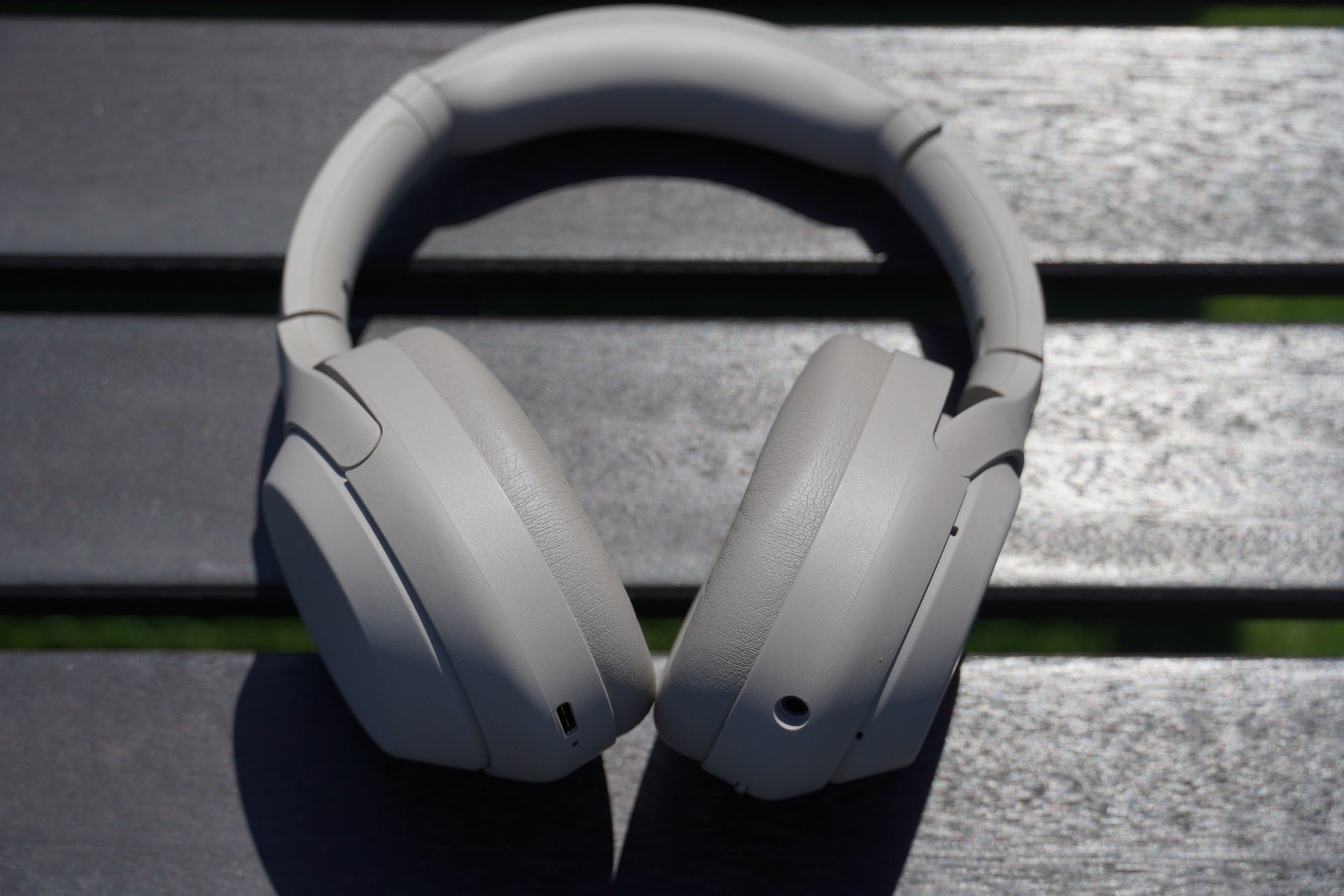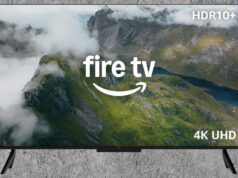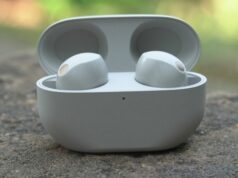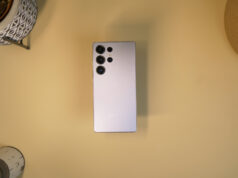If you’re searching for a new pair of headphones, you’re spoiled for choice in 2024. However, certain pairs continue to stand out from the rest. We’ve compiled a list of the best headphones available right now.
Every pair of headphones on this list has been put through a series of real-world tests, allowing us to determine to the best of our ability which of these headphones are worth your money.
This includes examining the design and feel of each pair of headphones to ensure they’re comfortable enough to wear for extended periods and listening to a variety of music genres and artists to put the sound quality to the test. We also make our way through any additional features, whether that be active noise cancellation, a transparency mode, a voice assistant, a companion app or something else entirely, and ensure the wireless connection is up to par.
Finally, we test the battery life of every pair of headphones that arrive in our office to ensure that they live up to the manufacturer’s claims on the box.
We’ve gathered our favourite headphones for different use cases and budgets in this guide, including the best wireless headphones, the best noise cancellers, the best affordable on-ears, the best for professionals and the best kids’ headphones, to name a few categories. This means that, no matter what you’re looking for, you should be able to find a pair of headphones that match your needs in this list.
Scroll down further and you’ll find a summary of each pair, along with pros, cons and links to our full, in-depth reviews with images and further comparisons.
Finally, if you haven’t found what you’re looking for on this list, don’t fret. We’ve got plenty more audio best lists that are worth a look, including the best noise cancelling headphones, best running headphones, best wireless headphones and best wireless earbuds.
Best headphones at a glance
How we test
Not just anybody can review a pair of headphones. You don’t need superhuman hearing to tell what’s good, but you do need to know what to listen out for.
Our headphone tests are done by some of the best and most prolific reviewers in the industry, with years of experience listening to everything from the plasticky freebie earbuds that come with your smartphone, to five-figure beasts of glass and marble. We love music and we want your tunes to sound good, too.
So we listen every pair of headphones we can get on or in our ears. We use a variety of sources, from basic MP3s playing on a laptop to high-quality tracks on dedicated hi-res audio players.
Our test tracks are wide-ranging to give headphones a thorough challenge. They’re also familiar, so we know every track backwards, and we know which bits might trouble the lesser performers.
We listen again and again, and we do that for weeks in case the sound changes – because it usually does. Then we’ll listen to similarly priced rivals and come up with a verdict that reflects the performance and features for the money.
Sony WH-1000XM5
Best wireless headphones
Pros
- Excellent comfort
- Musical, rich audio performance
- Impressively clean and natural noise cancellation
- Superb Ambient Mode
- Great call quality
Cons
- Non-foldable design
- Connection gets choppy in busy areas
Winner of the best headphone and best noise cancelling headphones categories at our 2022 awards, the Sony WH-1000XM5 feature a new design and some subtle changes to the audio but they add up to one of the most impressive headphones at their price.
They have a more modern look than the WH-1000XM4 and the redesigned earcups can’t be collapsed, following in the footsteps of Bose’s NC 700 HP and Apple’s AirPods Max. This change has been done to offer better noise cancelling performance, and in testing we found it did reduced wind noise for a quieter ANC experience.
We also sensed the WH-1000XM5’s noise cancelling tackled higher frequency sounds with more confidence than the XM4, although we did feel the XM4 model suppressed voices a tad better. The new mode coped with other noises well, with everything from big crowds to commuting on transport reduced to a hush. With eight microphones to assist call quality and noise cancellation, the Ambient Mode offered a noticeable improvement over the older model with a clearer, natural sound.
There have also been incremental improvements to the already great audio performance. The mid-range sounds slightly richer and more detailed, with increased definition and clarity to instruments and voices. Music also takes place within a wider soundstage and bass has more texture and clarity then on older models. Taken together and it makes the WH-1000XM5 a great listen with any genre.
For features it’s much the same story as before. Quick Attention filters through outside sound at a moment’s notice, and Speak To Chat (which pauses music when you’re speaking) are back. Battery life remains unchanged at 30 hours of runtime, and we managed to get around a week’s use from these headphones. If you’re after more longevity then both the Technics EAH-A800 and Sennheiser Momentum 4 Wireless offer 50 and 60 hours respectively.
Reviewer: Kob Monney
Full Review: Sony WH-1000XM5
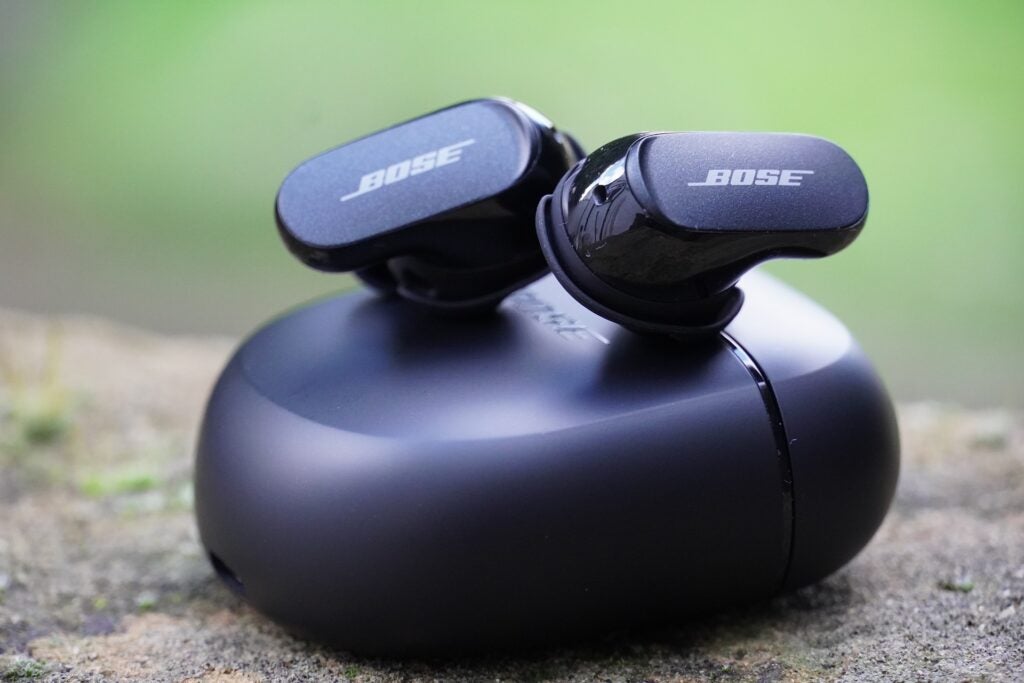
Bose QuietComfort Earbuds II
Best ANC earbuds
Pros
- Top-tier noise cancelling and ambient modes
- Improved sound over the original
- Slimline design
- AptX support on the way
- Improved battery capacity
Cons
- More expensive than before
- Average call quality
- Still susceptible to wind noise
Like the Autobots vs Decepticons, Bose and Sony are locked in a never-ending battle of one-upmanship when it comes to their noise-cancelling headphones, and while Sony won out with their over-ears, we felt that in terms of ANC performance Bose won with its QuietComfort Earbuds II.
The sequel has been revamped from the original QuietComfort Earbuds, not as chunky (but still fairly big) and ditching the Stay Hear tips for a shape that fits into the ear better and helps remove some ambient noise before the ANC kicks in. They’re comfortable to wear over long periods of use, though it’s a slight disappointment that we can hear some minor wind noise with ANC activated, an issue we had hoped the new model had eradicated.
Despite that, this is the finest noise-cancellation we’ve tested in a true wireless so far, removing more sounds than its nearest challenger in the Sony WF-1000XM4. While not every sound was removed, the Bose weren’t far off from achieving that goal. When we stopped using them we were always surprised by how loud our surroundings were. Improvements include being better at suppressing people’s voices, which it does much better than the original was able to.
The Aware mode is excellent too, producing a clear, detailed, and natural performance. Bose’s ActiveSense technology works similarly to the AirPods Pro 2‘s transparency mode in automatically reducing loud background noises. When we used it on the London Underground, we found it worked very well during a conversation with another person.
The audio performance is noticeably better on this model than it is on the original, with the top end of the frequency range brighter and bass is bigger and punchier. Vocals carry more weight too, and there’s a better sense of depth and width than we can recall with the original. The sequel is a better listen overall.
There aren’t many features but there is a three-band EQ to customise the sound profile of the buds within the app, and we found the wireless performance to be excellent, with barely a hint of a dropout noted. One disappointment is the call quality performance. Vocal clarity is good, but in noisy areas the earphones let in too much noise.
Battery life is on level footing with the WF-1000XM4 with 24 hours available. They’re also due to get support for aptX Adaptive and aptX Lossless, which should improve the wireless performance and allow for higher quality audio playback. All in all this is an impressive performance that improves upon the original in many ways. It’ll be interesting to see what Sony’s response is whenever its next true wireless appears on the scene.
Reviewer: Kob Monney
Full Review: Bose QuietComfort Earbuds II

Rode NTH-100
Best wired headphones for professional use
Pros
- Articulate, convincing sound in all scenarios
- Built to last
- Good-looking (in a purposeful sort of way)
Cons
- Sonic even-handedness won’t suit everybody
- Hard-wired configuration won’t be for all
- Earpads heat up over time
The Røde NTH-100 are a fantastic choice if you’re in need of a pair of headphones for professional use. This is reflected in their detailed and balanced audio that makes them ideal as a pair of reference headphones for mixing, especially when dealing with lossless audio.
Our reviewer found the bass carried plenty of depth without the typical superficial excitement present with cheaper headphones. The mid-range unpacks every last detail of a track, alongside a smooth top-end that makes listening to these headphones a pleasure.
The NTH-100 lack the features of wireless headphones like the Sony WH-1000XM5 and Bose QuietComfort Earbuds on this list. What you do get is a very long 2.4m cable (an optional 1.2m is available for extra cost) and a clever fitting system known as FitLock that allows you to lock in the headband position of the NTH-100 so it remains in the correct position for your head at all times.
In terms of their design, the NTH-100 adhere totally to the expectation of what over ear headphones look like in general. They build quality is very fine, the all-black finish and Alcantara-covered memory foam for earpads contact helps them to be especially comfortable. If performance-per-pound is what you’re in the market for, then the Røde are great whether it’s for casual or critical listening.
Reviewer: Simon Lucas
Full Review: Røde NTH-100
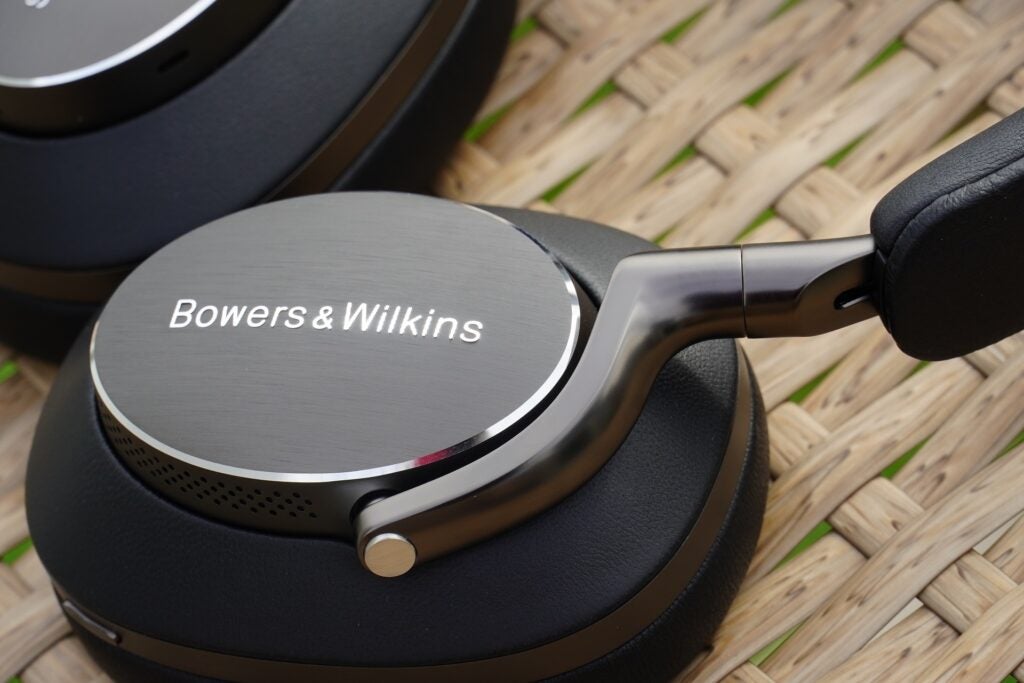
Bowers and Wilkins Px8
Best premium wireless headphones over £500
Pros
- Improves on the PX7’s audio quality
- Confident noise cancellation
- Graceful looks
- Tremendous wireless performance
- Very good call quality
Cons
- Expensive
- More natural-sounding and dynamic headphones from Focal and DALI
When it comes to premium wireless headphones, there’s a growing selection of headphones from the likes of Apple, Master & Dynamic, Mark Levinson, but the headphones we feel are right at the top of the list are the Bowers & Wilkins Px8.
Priced at £599 / $699, the Px8 exude class in terms of the appearance with the Black and Tan leather versions; and if you want even classier options then there are McLaren Racing and Bond 007 special editions (though these are more expensive. The build quality is as you’d expect from a headphone that costs this much, and they’re comfortable to wear over long periods of time as we never felt any undue pressure when wearing them.
The audio performance is the main reason to purchase these headphones given the prestige of the Bowers & Wilkins brand. The angled 40mm dynamic full-range speakers offer a large and expansive soundstage, taking a neutral approach to the frequency range, given low frequencies good definition and punch, with a sharp and clear midrange and the high frequencies are distinctive and bright. They are an excellent listen with a range of genres.
They support adaptive ANC and while the performance isn’t as strong as either the Sony WH-1000XM5 or Bose QuietComfort 45, they’re effective effective at suppressing noise on the underground, as well as hushing voices and managing wind noise to acceptable levels. Even in noisy environments, the Px8 headphones condense the volume of a crowd into a more manageable sound, strong enough with their ANC performance to usher in a sense of calm wherever you are.
Call quality is among the best we’ve heard with voices coming across clearly and background noises being kept to a minimum. The wireless connection is superb with barely any dips in the signal, and the battery is respectable at thirty hours, although the likes of the Sennheiser Momentum Wireless 4 can offer more.
If you want high fidelity sound, then look no further than the Bowers & Wilkins Px8.
Reviewer: Kob Monney
Full Review: Bowers & Wilkins Px8
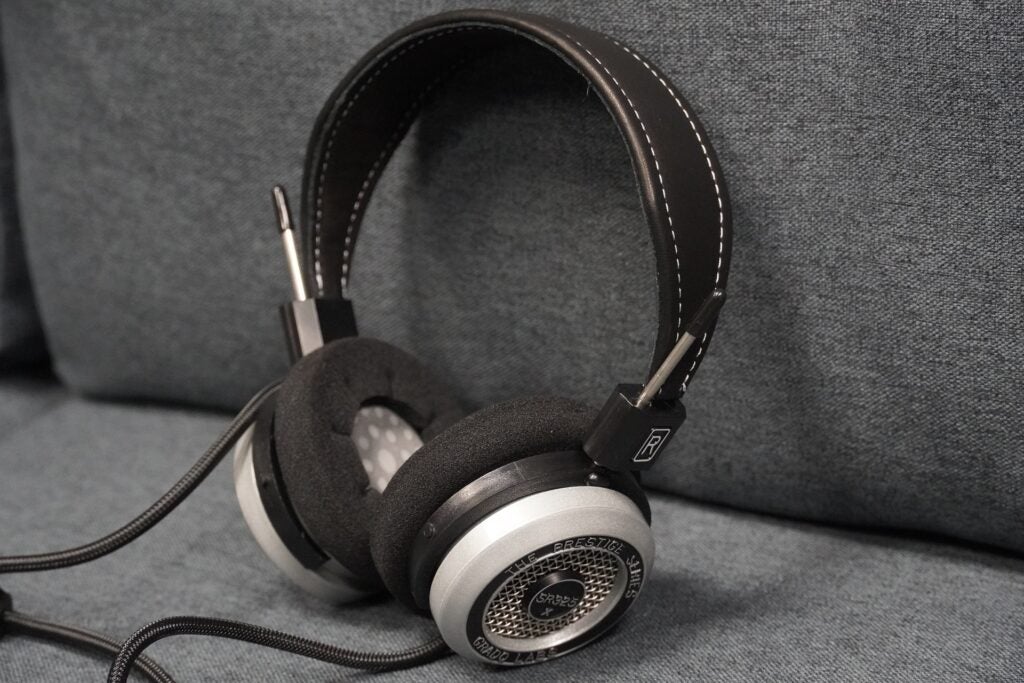
Grado SR325x
Best wired on-ears
Pros
- Insightful, detailed and spacious presentation
- Striking design
- Low impedance drivers
Cons
- Comfort may be an issue for some
- Design isn’t especially portable
Anyone familiar with the Grado brand will be able to identify the SR325x as one of their headphones in a heartbeat. A pair of on-ears with an open-backed design, it’s an approach that’s been at the heart of Grado’s offering for decades, the open-backed design grants these headphones a bigger, more spacious soundstage.
It does make them a leaky-sounding pair of headphones, so if you’re using these on public transport, be prepared to to have people looking at you. The Grado SR325x offer terrific consistency in their balanced approach to music, emphasising a natural tone and fantastic clarity with instruments and vocals. We found the stereo image to be full of depth, the sharpness and definition, giving music a great sense of fidelity.
You will need high quality audio files to get the best from them but with their 38 ohm impedance, you’ll be able to connect these wired headphones to a range of devices without the need for further amplification to drive them.
We found the design to be of premium quality, the metal housing for each earcup offers a durable finish, and the brand’s ‘F’ type earcups are ones we felt were especially comfortable during use. As seems to be the case with on-ears, you may experience a degree of pinching depending on the size of your ear, in which case an over-ear such as the Monolith M1070 or Austrian Audio Hi-X65 may be preferable.
Nevertheless, these are an insightful, precise and detailed pair of on-ear headphones, an audiophile pair of cans without the price tag to go with it.
Reviewer: Kob Monney
Full Review: Grado SR325x
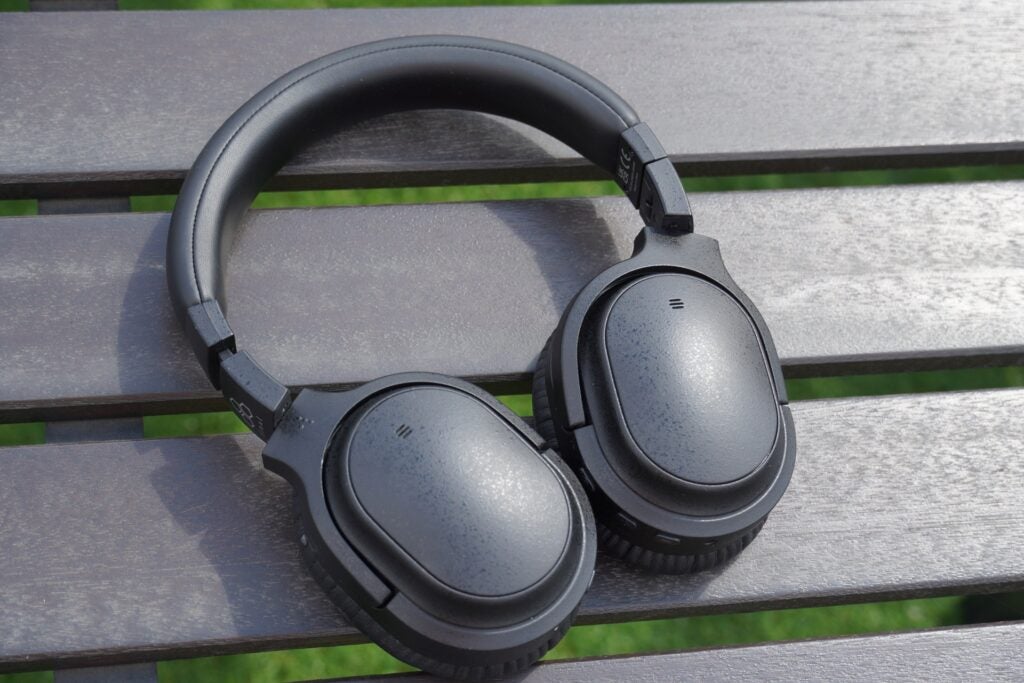
Final UX3000
Best affordable noise cancelling headphones
Pros
- Good comfort
- Effective ANC
- Rich, warm sound
- Solid battery life
- Simple operation
Cons
- Stripped-down feature set
- Minimalist looks may be interpreted as bland
If the likes of the Sony WH-1000XM5 are too far out of your budget, then the Final UX3000 demonstrate that you don’t need to spend a fortune for good noise cancelling headphones.
The UX3000 are not heavy on the features with a simple on-off button for the active noise cancellation but they deal with persistent noises, busy road junctions and crowds of people well. The noise cancellation can be switched on without having to power the headphones, too. Similar to the Ausounds AU-XT ANC, we’d recommend turning the ANC on if you’re listening to music as they sound better with it on.
The audio here is some of the best we’ve heard for less than £150, eliciting a confident, musical performance from the tracks we played, with weighty bass and a rich mid-range rich. The warmth of their presentation means they’re not quite as detailed or incisive as either the Austrian Audio Hi-X25BT or the Cleer Enduro ANC, but overall we found the UX3000 had a better handle over music those two rivals, with solid dynamics and a decently wide soundstage.
We found 25-hour battery life good enough to last a week with general use and with ANC off the headphones can reach up to 35 hours. The design is minimalist in appearance, the finish referred to as ‘Shibo’, an old terms that refers to wrinkled paper of leather, a texture that can repel dust or dirt for an always-clean look
Operation is via physical buttons that cover volume, ANC and playback making the UX3000 an easy pair of headphones to use. We also found they were comfortable over extended periods, which we found made them a good partner for commutes into work.
Reviewer: Kob Monney
Full Review: Final UX3000
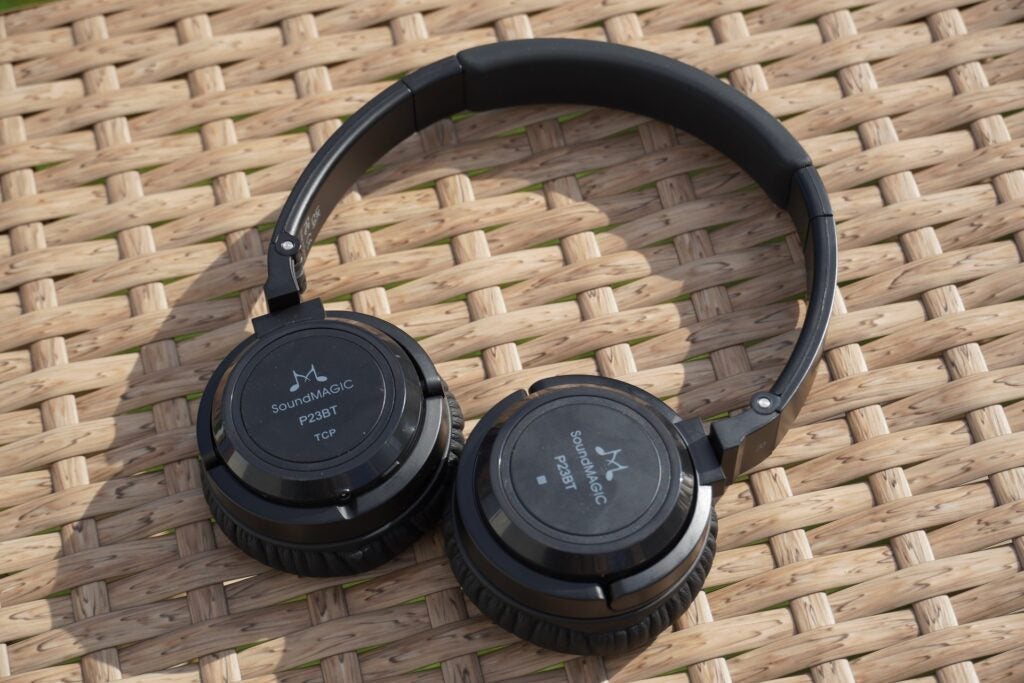
SoundMagic P23BT
Best affordable on-ears
Pros
- Refined and detailed sound
- Compact and lightweight design
- Long battery life
- Cheap
Cons
- Can pinch on the ears
- Not what you’d call stylish
On-ear headphones have their pros and cons, but they still remain a popular choice among commuters, and the SoundMagic P23BT are one of the best we’ve reviewed in recent years.
The P23BT are an affordable (£49.99), support aptX-HD Bluetooth for higher quality sound and can last for around 50-60 hours.
The design has the same issues that plague any on-ear, in that they can pinch around the earlobes (especially if you have bigger ears) and it can leak sound in from the outside world. Get past that and the SoundMagic have a lightweight and foldable design that made it easier for us to stow away when not in use. Touch controls are cleverly integrated into the earcups. In use, they’re surprisingly responsive.
Features are few for a pair of headphones such as these, with aptX-HD Bluetooth the most notable in offering wearers the chance to stream music at a higher quality bit-rate. Our reviewer found the headphones capable of much more subtlety than expected, with a midrange full of detail, treble that’s bright and sharp and detailed bass. The Marshall Major IV are a great deal more bassy in their performance, but we find the P23BT more balanced overall.
Given the price these headphones are bargain, and for those not big on features and just need a simple pair of on-ears to listen to, we highly recommend the SoundMagic.
Reviewer: Kob Monney
Full Review: SoundMagic P23BT
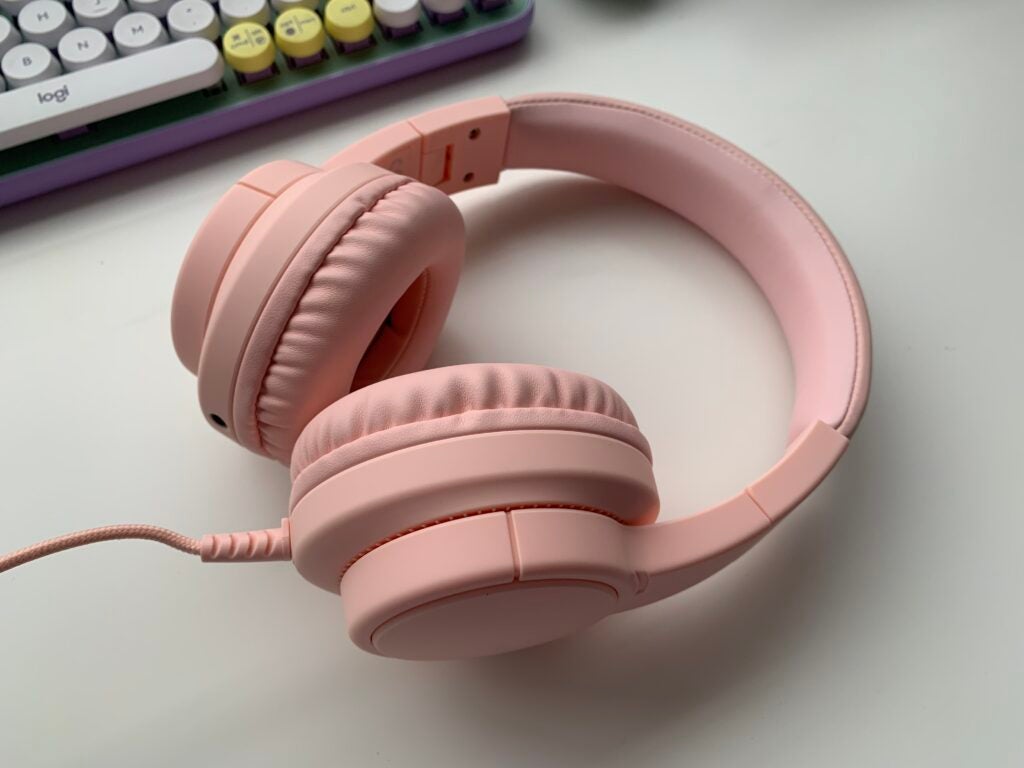
Tribit TR-KH01
Best affordable kids’ headphones
Pros
- Cute and comfortable design
- Volume-limited to protect ears
- Great sound quality for their price
Cons
- No volume up/down button on the cable
- Call quality suffers with volume-limiting on
- Kids can turn off volume-limiting easily
The Tribit Starlet01 Kids are cute, comfortable and volume-limited, making them a great buy for any parent looking to protect their kids’ ears while they do homework, watch movies and play games.
The headphones have a bright, single-colour design, making them look vibrant and age-appropriate without running the risk of appearing too childish in the same vein as the animal ear-toting Planet Buddies Volume Limited Headphones.
The fit is comfortable too, with the headband being lightweight and adjustable, and the ear cups soft and padded.
The headline feature here is the volume-limiting technology. This feature ensures the volume is kept to the WHO-recommended level of 85dB, with the option to switch over to 94dB in busier environments. This is a popular feature for kids’ headphones as it helps to prevent issues like noise-induced hearing loss. You can also find volume-limiting on certain adult headphones, such as the PuroPro Hybrid ANC headphones.
The Starlet01 Kids are wired headphones, meaning there’s no Bluetooth support for wireless listening. One benefit to this is that you don’t need to worry about charging up the battery before a trip, though you may find you need to pick up an adapter to use the headphones with any device that doesn’t carry a 3.5mm jack (the iPhone 14, for example).
For those in need of volume-limited wireless headphones, look toward the Planet Buddies Wireless Headphones or Tribit’s own Starlet02 kids headphones.
Despite this, the Starlet01 outperform the Planet Buddies when it comes to audio quality, offering fantastic tonal balance and detail for such an affordable pair of kids’ headphones.
There are some drawbacks to the Tribit Starlet01. Playback controls are limited and the volume limit switch is easily accessible to kids. However, the volume cannot go higher than 94dB and both the sound quality and fit are fantastic, making the Starlet01 our favourite pair of budget kids’ headphones.
Reviewer: Hannah Davies
Full Review: Tribit Starlet01 Kids
We also considered…
FAQs
The Sony WH-1000XM5 would get vote for the best overall headphones. The feature set is comprehensive, the wireless connection reliable, and of course, they sound excellent for the money, too.


